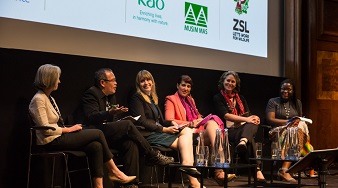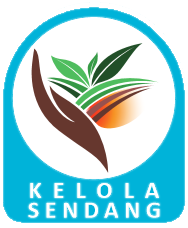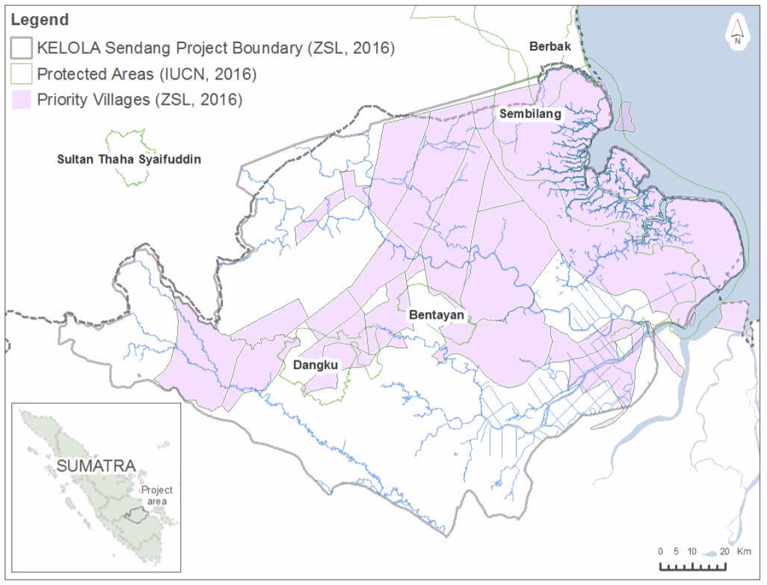As ZSL’s palm oil technical advisor, I attended this year’s Roundtable on Sustainable Palm Oil (RSPO) European meeting in London on 12-13 June 2017 to take part in a panel discussion on innovation and partnerships. The entire conference provided our team with opportunities to engage with companies on their forthcoming transparency assessments, but also to highlight the various reasons why ZSL and many other conservation organisations work with the palm oil industry.
Biodiversity at risk
 Worldwide biological diversity is in steep decline. Through joint analysis by WWF and ZSL, the Living Planet Report showed that vertebrate populations have plummeted by 58% from 1970-2012, and we are on track to lose two thirds by 2020.
Worldwide biological diversity is in steep decline. Through joint analysis by WWF and ZSL, the Living Planet Report showed that vertebrate populations have plummeted by 58% from 1970-2012, and we are on track to lose two thirds by 2020.
This loss of critical biodiversity is a direct result of environmental pressure from unsustainable use of the world’s natural habitats. On a global level, human activities including deforestation, pollution, overfishing – compounded by the effects of climate change – are pushing species to the edge of existence.
Indonesia is home to some of the world’s most iconic and threatened species, and from 1990-2005, the country lost over 25% of its forest and woodland habitat.
As producer companies are responsible for managing large tracts of land, they have a critical role to play in managing this biodiversity decline. Encouragingly, national and subnational governments are showing an appetite for change, as demonstrated through a public-private people partnership, KELOLA Sendang.
KELOLA Sendang

KELOLA Sendang is a landscape project led by ZSL in the Sembilang-Dangku landscape in northeastern South Sumatra, Indonesia. The project seeks to facilitate and support government, the private sector and local communities to pilot a sustainable landscape management and partnership model, helping the Government of South Sumatra to achieve its Green Growth Vision, which looks to achieve inclusive economic growth, biodiversity conservation and forest protection and restoration. It also aims to reduce land-based greenhouse gas (GHG) emissions through preventing deforestation, peatland drainage and fires.
There are numerous competing pressures on the landscape including forest conversion, fires, illegal logging, growing human populations and peatland drainage. These drive environmental degradation, increase GHG emissions, and contribute to biodiversity loss. Given the multiple pressures on the landscape, a diverse range of partners is needed – one actor cannot work alone in this. The partners in this project are establishing biophysical baselines and monitoring for peat and lowland landscape management, ensuring broader participation of stakeholders in decision-making, and including community participation in land use and boundary mapping.

Another component of this project is using SPOTT to assess the environmental, social and governance (ESG) transparency of commodity producing companies – including those operating within the Sembilang-Dangku landscape. SPOTT ESG transparency assessments of timber, pulp and paper companies will be published in October, while our updated assessments of palm oil producers and traders – under a revised indicator framework – are due out at the end of this month.
The project is also working towards increasing connectivity between core habitats, creating corridors for tigers and other wildlife. ZSL first started working with the palm oil industry in 2001, advising companies on how to manage populations of Sumatran tigers found in their concession sites. On the evening of the close of the RSPO European Roundtable in London, we held an evening reception focusing on tiger habitat conservation following the RSPO European Roundtable at our Tiger Territory exhibit at ZSL London Zoo, to demonstrate our shared vision for a sustainable palm oil industry.
On behalf of ZSL, I would like to thank RSPO for hosting the 2017 European Roundtable in London, and I look forward to further engagement with companies, investors and other stakeholders in supporting transparency and moving towards more sustainable practices in the palm oil industry.
Banner image credit: James Anderson, World Resources Institute on Flickr CC BY-NC-SA 2.0
